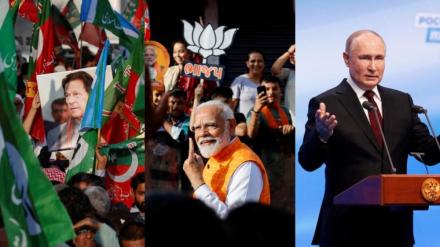In 2024, the world witnessed a wave of elections across more than 80 nations, reflecting a mosaic of democratic triumphs, authoritarian power plays and societal upheavals. From major superpowers to fragile states, elections tested political systems, shaped futures and sparked debates on democracy’s resilience.
Here’s a deep dive into the significant elections that shaped the global landscape this year:
Bangladesh: Hasina’s controversial fifth term
On January 7, Sheikh Hasina secured a fifth term as Prime Minister in an election marred by allegations of widespread suppression. With voter turnout at a meager 40%, the opposition faced a ruthless crackdown, resulting in mass arrests and deaths in custody. Hasina’s regime faced growing dissent, culminating in her resignation and ultimately fleeing the country in August following unprecedented student-led protests over inequities in public sector job quotas.
Pakistan: A victory without power for Imran Khan
Pakistan’s February 8 election marked a dramatic political struggle. Despite being imprisoned, former Prime Minister Imran Khan’s PTI party emerged as the most voted party. Yet, a coalition led by Shehbaz Sharif’s PML-N and the PPP thwarted Khan’s return to power. The election underscored the military’s pervasive role in the country’s political landscape.
Russia: Putin’s mandate amid global criticism
In March, Vladimir Putin clinched a fifth term in an election widely condemned as neither free nor fair. With 87.28% of the vote and record turnout reported at 74%, the election’s credibility was questioned, especially in the absence of meaningful opposition following the mysterious death of Alexei Navalny. The polls, held even in occupied Ukrainian regions, symbolised an effort to consolidate Putin’s war narrative and authority.
India: A politically charged election season
From April to June, India underwent its largest democratic exercise, with over 900 million eligible voters. Prime Minister Narendra Modi’s BJP secured a third consecutive term but with reduced strength, winning 240 seats in the Lok Sabha, down from 303 in 2019. The NDA coalition retained power but faced setbacks in key states, including Uttar Pradesh, where Akhilesh Yadav’s Samajwadi Party made significant gains. Modi’s government, however, celebrated the return of democratic elections in Jammu and Kashmir after years of central rule.
Maldives: A pivot to China
On April 21, Maldivian voters handed a parliamentary supermajority to President Mohamed Muizzu’s party, signaling a shift towards China and away from traditional ally India. This election reflected the growing geopolitical tug-of-war in the Indian Ocean region.
South Africa: ANC loses majority
In May, South Africa’s ruling ANC faced its most significant electoral setback since the end of apartheid, losing its parliamentary majority. Years of corruption, leadership scandals and systemic challenges led to voter disillusionment. Coalition talks began as Cyril Ramaphosa’s presidency hung in the balance.
Mexico: Voters elect first female President
Claudia Sheinbaum became Mexico’s first female and Jewish president on June 2, following a landslide victory. Despite her triumph, the election highlighted the country’s escalating violence, with over 30 candidates killed. Sheinbaum’s administration faces daunting challenges, including addressing gang-related violence and managing complex relations with the US over migration.
UK: Starmer’s Labour triumphs
On July 4, Labour leader Keir Starmer ended 14 years of Conservative dominance in the UK, propelled by public discontent rather than enthusiasm for his party. Labour secured 60% of parliamentary seats on 33.8% of the vote, exposing the limitations of the first-past-the-post system. Starmer inherited a nation grappling with crises in migration, health and housing.
Sri Lanka: A Marxist leader takes the helm
Sri Lanka turned a new page on September 21, electing Anura Kumara Dissanayake as president. His victory signaled a rejection of the traditional political elite blamed for the country’s economic collapse. As leader of the Janatha Vimukthi Peramuna (JVP), Dissanayake brings a leftist perspective to tackling Sri Lanka’s financial woes.
United States: Trump’s unprecedented return
The November 5 US election marked a dramatic political twist as Donald Trump reclaimed the presidency, defeating Kamala Harris. His win, despite legal troubles and a near-assassination attempt, reignited fears about America’s democratic and geopolitical direction. Trump’s hardline policies, including immigration crackdowns and climate skepticism, promise a contentious presidency.
The 2024 electoral season showcased democracy’s resilience and fragility. While nations like Bangladesh and Russia saw elections used as tools of repression, others like Sri Lanka and Mexico reflected people’s hunger for change. Major powers such as India and the US underscored the complexity of modern democracies navigating internal and external pressures.
